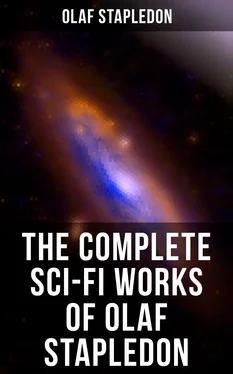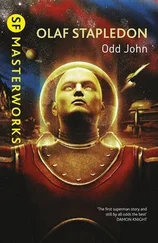Olaf Stapledon - The Complete Sci-Fi Works of Olaf Stapledon
Здесь есть возможность читать онлайн «Olaf Stapledon - The Complete Sci-Fi Works of Olaf Stapledon» — ознакомительный отрывок электронной книги совершенно бесплатно, а после прочтения отрывка купить полную версию. В некоторых случаях можно слушать аудио, скачать через торрент в формате fb2 и присутствует краткое содержание. Жанр: unrecognised, на английском языке. Описание произведения, (предисловие) а так же отзывы посетителей доступны на портале библиотеки ЛибКат.
- Название:The Complete Sci-Fi Works of Olaf Stapledon
- Автор:
- Жанр:
- Год:неизвестен
- ISBN:нет данных
- Рейтинг книги:5 / 5. Голосов: 1
-
Избранное:Добавить в избранное
- Отзывы:
-
Ваша оценка:
- 100
- 1
- 2
- 3
- 4
- 5
The Complete Sci-Fi Works of Olaf Stapledon: краткое содержание, описание и аннотация
Предлагаем к чтению аннотацию, описание, краткое содержание или предисловие (зависит от того, что написал сам автор книги «The Complete Sci-Fi Works of Olaf Stapledon»). Если вы не нашли необходимую информацию о книге — напишите в комментариях, мы постараемся отыскать её.
Novels:
Last and First Men: A Story of the Near and Far Future
Last Men in London
Odd John: A Story Between Jest and Earnest
Star Maker
Darkness and the Light
Sirius: A Fantasy of Love and Discord
Death into Life
Short Stories:
The Flames (1947)
The Seed and the Flower
The Road to the Aide Post
A Modern Magician
East is West
A World of Sounds
Arms Out of Hand
The Complete Sci-Fi Works of Olaf Stapledon — читать онлайн ознакомительный отрывок
Ниже представлен текст книги, разбитый по страницам. Система сохранения места последней прочитанной страницы, позволяет с удобством читать онлайн бесплатно книгу «The Complete Sci-Fi Works of Olaf Stapledon», без необходимости каждый раз заново искать на чём Вы остановились. Поставьте закладку, и сможете в любой момент перейти на страницу, на которой закончили чтение.
Интервал:
Закладка:
But what is it, you may ask, that we seek to contribute to the past? We seek to afford intuitions of truth and of value, which, though easy to us from our point of vantage, would be impossible to the unaided past. We seek to help the past to make the best of itself, just as one man may help another. We seek to direct the attention of past individuals and past races to truths and beauties which, though implicit in their experience, would otherwise be overlooked.
We seek to do this for two reasons. Entering into past minds, we become perfectly acquainted with them, and cannot but love them; and so we desire to help them. By influencing selected individuals, we seek to influence indirectly great multitudes. But our second motive is very different. We see the career of Man in his successive planetary homes as a process of very great beauty. It is far indeed from the perfect; but it is very beautiful, with the beauty of tragic art. Now it turns out that this beautiful thing entails our operation at various points in the past. Therefore we will to operate.
Unfortunately our first inexperienced efforts were disastrous. Many of the fatuities which primitive minds in all ages have been prone to attribute to the influence of disembodied spirits, whether deities, fiends, or the dead, are but the gibberish which resulted from our earliest experiments. And this book, so admirable in our conception, has issued from the brain of the writer, your contemporary, in such disorder as to be mostly rubbish.
We are concerned with the past not only in so far as we make very rare contributions to it, but chiefly in two other manners.
First, we are engaged upon the great enterprise of becoming lovingly acquainted with the past, the human past, in every detail. This is, so to speak, our supreme act of filial piety. When one being comes to know and love another, a new and beautiful thing is created, namely the love. The cosmos is thus far and at that date enhanced. We seek then to know and love every past mind that we can enter. In most cases we can know them with far more understanding than they can know themselves. Not the least of them, not the worst of them, shall be left out of this great work of understanding and admiration.
There is another manner in which we are concerned with the human past. We need its help. For we, who are triumphantly reconciled to our fate, are under obligation to devote our last energies not to ecstatic contemplation but to a forlorn and most uncongenial task, the dissemination. This task is almost intolerably repugnant to us. Gladly would we spend our last days in embellishing our community and our culture, and in pious exploration of the past. But it is incumbent on us, who are by nature artists and philosophers, to direct the whole attention of our world upon the arid labour of designing an artificial human seed, producing it in immense quantities, and projecting it among the stars. If there is to be any possibility of success, we must undertake a very lengthy programme of physical research, and finally organize a world-wide system of manufacture. The work will not be completed until our physical constitution is already being undermined, and the disintegration of our community has already begun. Now we could never fulfil this policy without a zealous conviction of its importance. Here it is that the past can help us. We, who have now learnt so thoroughly the supreme art of ecstatic fatalism, go humbly to the past to learn over again that other supreme achievement of the spirit, loyalty to the forces of life embattled against the forces of death. Wandering among the heroic and often forlorn ventures of the past, we are fired once more with primitive zeal. Thus, when we return to our own world, we are able, even while we preserve in our hearts the peace that passeth understanding, to struggle as though we cared only for victory.
3. EPILOGUE
Table of Contents
I am speaking to you now from a period about twenty thousand terrestrial years after the date at which the whole preceding part of this book was communicated. It has become very difficult to reach you, and still more difficult to speak to you; for already the Last Men are not the men they were.
Our two great undertakings are still unfinished. Much of the human past remains imperfectly explored, and the projection of the seed is scarcely begun. That enterprise has proved far more difficult than was expected. Only within the last few years have we succeeded in designing an artificial human dust capable of being carried forward on the sun’s radiation, hardy enough to endure the conditions of a trans-galactic voyage of many millions of years, and yet intricate enough to bear the potentiality of life and of spiritual development. We are now preparing to manufacture this seminal matter in great quantities, and to cast it into space at suitable points on the planet’s orbit.
Some centuries have now passed since the sun began to show the first symptoms of disintegration, namely a slight change of colour towards the blue, followed by a definite increase of brightness and heat. Today, when he pierces the ever-thickening cloud, he smites us with an intolerable steely brilliance which destroys the sight of anyone foolish enough to face it. Even in the cloudy weather which is now normal, the eye is wounded by the fierce violet glare. Eye-troubles afflict us all, in spite of the special glasses which have been designed to protect us. The mere heat, too, is already destructive. We are forcing our planet outward from its old orbit in an ever-widening spiral; but, do what we will, we cannot prevent the climate from becoming more and more deadly, even at the poles. The intervening regions have already been deserted. Evaporation of the equatorial oceans has thrown the whole atmosphere into tumult, so that even at the poles we are tormented by hot wet hurricanes and incredible electric storms. These have already shattered most of our great buildings, sometimes burying a whole teeming province under an avalanche of tumbled vitreous crags.
Our two polar communities at first managed to maintain radio communication; but it is now some time since we of the south received news of the more distressed north. Even with us the situation is already desperate. We had recently established some hundreds of stations for the dissemination, but less than a score have been able to operate. This failure is due mainly to an increasing lack of personnel. The deluge of fantastic solar radiation has had disastrous effect on the human organism. Epidemics of a malignant tumour, which medical science has failed to conquer, have reduced the southern people to a mere remnant, and this in spite of the migration of the tropical races into the Antarctic. Each of us, moreover, is but the wreckage of his former self. The higher mental functions, attained only in the most developed human species, are already lost or disordered, through the breakdown of their special tissues. Not only has the racial mind vanished, but the sexual groups have lost their mental unity. Three of the sub-sexes have already been exterminated by derangement of their chemical nature. Glandular troubles, indeed, have unhinged many of us with anxieties and loathings which we cannot conquer, though we know them to be unreasonable. Even the normal power of ‘telepathic’ communication has become so unreliable that we have been compelled to fall back upon the archaic practice of vocal symbolism. Exploration of the past is now confined to specialists, and is a dangerous profession, which may lead to disorders of temporal experience.
Degeneration of the higher neural centres has also brought about in us a far more serious and deep-seated trouble, namely a general spiritual degradation which would formerly have seemed impossible, so confident were we of our integrity. The perfectly dispassionate will had been for many millions of years universal among us, and the corner-stone of our whole society and culture. We had almost forgotten that it has a physiological basis, and that if that basis were undermined, we might no longer be capable of rational conduct. But, drenched for some thousands of years by the unique stellar radiation, we have gradually lost not only the ecstasy of dispassionate worship, but even the capacity for normal disinterested behaviour. Everyone is now liable to an irrational bias in favour of himself as a private person, as against his fellows. Personal envy, uncharitableness, even murder and gratuitous cruelty, formerly unknown amongst us, are now becoming common. At first when men began to notice in themselves these archaic impulses, they crushed them with amused contempt. But as the highest nerve centres fell further into decay, the brute in us began to be ever more unruly, and the human more uncertain. Rational conduct was henceforth to be achieved only after an exhausting and degrading ‘moral struggle’, instead of spontaneously and fluently. Nay, worse, increasingly often the struggle ended not in victory but defeat. Imagine then, the terror and disgust that gripped us when we found ourselves one and all condemned to a desperate struggle against impulses which we had been accustomed to regard as insane. It is distressing enough to know that each one of us might at any moment, merely to help some dear individual or other, betray his supreme duty toward the dissemination; but it is harrowing to discover ourselves sometimes so far sunk as to be incapable even of common loving-kindness toward our neighbours. For a man to favour himself against his friend or beloved, even in the slightest respect, was formerly unknown. But today many of us are haunted by the look of amazed horror and pity in the eyes of an injured friend.
Читать дальшеИнтервал:
Закладка:
Похожие книги на «The Complete Sci-Fi Works of Olaf Stapledon»
Представляем Вашему вниманию похожие книги на «The Complete Sci-Fi Works of Olaf Stapledon» списком для выбора. Мы отобрали схожую по названию и смыслу литературу в надежде предоставить читателям больше вариантов отыскать новые, интересные, ещё непрочитанные произведения.
Обсуждение, отзывы о книге «The Complete Sci-Fi Works of Olaf Stapledon» и просто собственные мнения читателей. Оставьте ваши комментарии, напишите, что Вы думаете о произведении, его смысле или главных героях. Укажите что конкретно понравилось, а что нет, и почему Вы так считаете.












